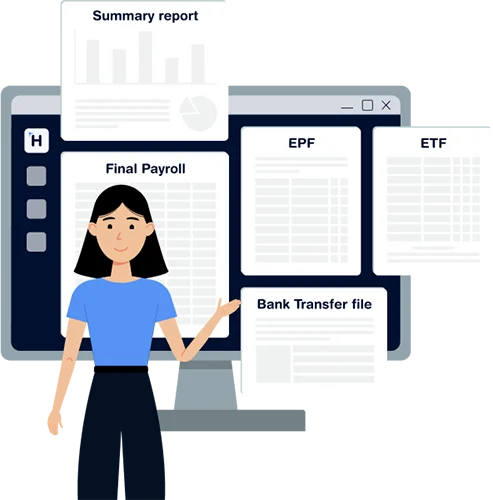Good day to all our payroll readers! This article will explore every vital detail you should know about APIT for your small business. As you all know, APIT was previously known as the Pay As You Earn Tax (PAYE) and was introduced in the year of assessment 2020/2021.
What is APIT?
Advanced Personal Income Tax, famously known for its short term APIT, is a deductible tax from the gains and profits payable to all the employees from their employment. After receiving permission to make the deduction, employers can deduct APIT from foreign employees living in Sri Lanka and Sri Lankan citizens. However, in terms of Sri Lankan citizens currently living abroad, employers can deduct their APIT without consent.
Next, we will explore why the APIT tax replaced the PAYE tax.
When and why was the APIT tax introduced in place of the former PAYE tax system?
APIT tax replaced the former PAYE tax system from 01.04.2020. It’s important to note that the PAYE tax system lasted for a while. The PAYE tax was introduced under the Inland Revenue Act No.24 of 2017, and it lasted till December 2019. The government intended to completely abolish the PAYE tax system to simplify the tax system for taxpayers. However, the Inland Revenue Department replaced the former PAYE tax system by introducing the APIT tax instead of abolishing it.
What criteria apply to those who are liable to pay APIT tax?
Employees who are Sri Lankan citizens living in Sri Lanka or foreign nationals residing in Sri Lanka who are earning an annual income of less than Rs. 3 million or who do not make a monthly income of Rs. 250,000 are not liable to pay APIT tax. That being said, employees earning an annual income of Rs. 3 million and a monthly income of Rs. 250,000 are liable to pay APIT tax.
What is the employer’s responsibility in APIT?
Just like employers play a pivotal role in calculating all kinds of tax, they are responsible under APIT tax. According to the guideline report prepared by the Inland Revenue Department for employers on deducting APIT tax from the employees’ income, every employer is required to deduct income tax from the gains and profits from each employee who is liable to pay income tax with the employee’s consent at the time of salary payment.
Next, we will be exploring the employee’s responsibility in APIT.
What is the employee’s responsibility in APIT?
Employees can be taxable if they fall into the 7 different tax tables under the APIT tax. If the employee has not provided a Primary Employment Declaration or is employed in more than one job, tax table 7 is applied.
The primary employment is the employment under which the employee has provided the employer with a declaration for that particular year. The employee must give a Primary Employment Declaration nominating the employment as their primary employment where the monthly exceeds or seems to exceed more than Rs. 250,000 or Rs. 3 million annually. The Declaration should be signed and dated by the employee and employer and may be related to one or more assessment years.
Moreover, an employee cannot hold more than one primary employment. However, if the employee’s primary employment ceases to exist, they can withdraw the Declaration only at the end of the assessment year.
What is the APIT tax table?
Employees can be taxable if they fall into the 7 different tax tables under the APIT tax. Deducting tax from an employee’s salary should be made by applying the relevant tax table.
Tax table 1 – Where the payment comprises regular profits from the employment of any Sri Lankan resident who has given permission or any non-resident but a citizen of Sri Lanka who has provided a Primary Employee Declaration, tax table 1 is applied.
Tax table 2 – Where the payment amounts to a Lump-sum payment which is a one-time payment rather than a series of payments, tax table 2 is applied. Examples of Lump-sum payments include bonus, leave encashment, medical expense reimbursements and market value of shares at the time of allotment under an employee share scheme.
Tax table 3 – Where the payment is a Once-and-for-all payment regardless of the employee’s consent, tax table 3 is applied.
Tax table 4 – Payment received by a non-resident employee of Sri Lanka apart from Sri Lankan employees regardless of their permission, tax table 4 is applied.
Tax table 5 – In a situation where the monthly profits of an employee from primary employment are less than Rs. 250,000, but the cumulative profits from the primary employment in any month of the assessment year is more than Rs. 3 million due to the payment of higher remuneration in certain months, tax table 5 is applied.
Tax table 6 – Where the payment amounts to a payment or reimbursement of the employee’s tax liability on his income from employment by the employer, tax table 6 is applied. This table is applicable for tax on tax rates. A tax on tax rate will apply:
- If an employer or any other third party settles an employee’s income tax without deducting the tax from the employee’s salary.
- The employer’s income tax reimbursement is already deducted from the employee’s salary.
Tax table 7 – When payment relates to the salary of an employee who has not provided the Primary Employee Declaration or has more than one employment, tax table 7 is applied.
How are APIT tables applied across the different brackets for APIT calculation?
It’s worth noting that the 7 different tax tables apply to different employees under various circumstances.
Tax table 1
- Monthly regular profit from employment is up to Rs. 250,000 – relief from tax.
- Monthly regular profit from employment is more than Rs. 250,000 but not more than Rs. 500,000 – 6% of regular monthly profits from employment less than Rs. 15,000.
- Monthly regular profit from employment is more than Rs. 500,000 but not more than Rs. 750,000 – 12% of regular monthly profits from employment less than Rs. 45,000.
- Monthly regular profit from employment is more than Rs. 750,000 – 18% of regular monthly profits from employment less than Rs. 90,000.
Tax table 2
Please refer to a detailed summary of how APIT tax is deducted from employees who fall under tax table 2 in http://www.ird.gov.lk/en/publications/APIT_Tax_Tables/2020-2021/Table%20%E2%80%93%202/03.AIPT_Table_02-Text.pdf
Tax table 3
Under tax table 3, the guideline for ETF, EPF and employers to retain amounts instead of income tax of employees from Once-and-for-all Payments (terminal benefits) published under the Circular No. SEC/2020/02, should be applied to all terminal benefits payable to all resident employees in Sri Lanka.
Tax table 4
Please click http://www.ird.gov.lk/en/publications/APIT_Tax_Tables/2020-2021/Table%20%E2%80%93%204/05.AIPT_Table_04-Text.pdf to understand how APIT tax is deducted from employees who fall under tax table 4.
Tax table 5
To gain a simple understanding of how APIT tax is deducted from employees under tax table 5, click http://www.ird.gov.lk/en/publications/APIT_Tax_Tables/2020-2021/Table%20%E2%80%93%205/06.AIPT_Table_05-Text.pdf
Tax table 6
Please click http://www.ird.gov.lk/en/publications/APIT_Tax_Tables/2020-2021/Table%20%E2%80%93%206/07.AIPT_Table_06-Text.pdf to understand how the tax on tax rates are applied in calculating APIT tax.
Tax table 7
The deduction rates for employees employed under more than one employer can be referred by clicking http://www.ird.gov.lk/en/publications/APIT_Tax_Tables/2020-2021/Table%20%E2%80%93%207/08.AIPT_Table_07-Text.pdf.
Therefore, it’s essential to keep these 7 different tax tables in mind to determine how APIT tax can be deducted from employees who fall under other circumstances.
What are the penalties applicable to small businesses for not complying with APIT?
If a small business fails to deduct tax payments from the employees’ income or remit them, the following penalties will be applied with interest:
A penalty equal to 20% of the due tax will be applied if the small business fails to pay or remit all or part of the APIT tax within 14 days of the due date.
An interest equal to 15% per month or part of the month will be applied to the amount of tax if the APIT tax is not paid within the due date.
What is the most effective way to make APIT payments and remain compliant?
How a small business can make APIT payments on time and remain compliant is by following the process below:
- The tax deducted from the employee’s income each month should be remitted to the Commissioner General of Inland Revenue on or before the 15th day of a month immediately succeeding that month.
- Tax payments can be made to any Bank of Ceylon branch using specified remittance forms provided by the Inland Revenue Department.
- Employers should read the instructions on the overleaf of the remittance form.
- Employers must keep the third copy of the remittance form after making the APIT tax payments.
Therefore, we hope that this article on APIT tax has provided you with a simplified and comprehensive understanding that is useful to your small business. Always remember to comply with tax payments to avoid unnecessary penalties and interests.
Resources
https://simplebooks.com/srilanka/advance-personal-income-tax/#1
https://www.taxadvisor.lk/article/to
http://www.ird.gov.lk/en/publications/APIT_Tax_Tables/2020-2021/Guideline/09.%20AIPT_2021_Guideline.pdf
http://www.ird.gov.lk/en/publications/sitepages/apit_tax_tables.aspx?menuid=1503
http://www.ird.gov.lk/en/publications/Circulars_Circulars/SEC-2020-02_E.pdf

